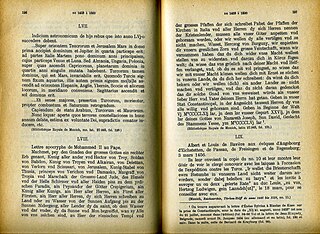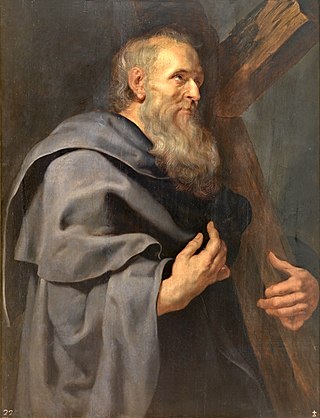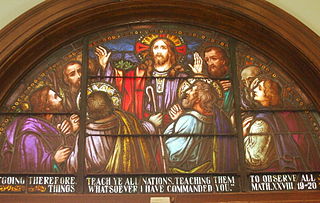Related Research Articles

Apocrypha are biblical or related writings not forming part of the accepted canon of Scripture. While some might be of doubtful authorship or authenticity, in Christianity, the word apocryphal (ἀπόκρυφος) was first applied to writings which were to be read privately rather than in the public context of church services. Apocrypha were edifying Christian works that were not considered canonical scripture. It was not until well after the Protestant Reformation that the word apocrypha was used by some ecclesiastics to mean "false," "spurious," "bad," or "heretical."

The King James Version (KJV), also the King James Version Bible (KJVB) and the Authorized Version (AV) is an Early Modern English translation of the Christian Bible for the Church of England, which was commissioned in 1604 and published in 1611, by sponsorship of King James VI and I. The 80 books of the King James Version include 39 books of the Old Testament, 14 books of Apocrypha, and the 27 books of the New Testament.

Matthew the Apostle is named in the New Testament as one of the twelve apostles of Jesus. According to Christian traditions, he was also one of the four Evangelists as author of the Gospel of Matthew, and thus is also known as Matthew the Evangelist.
The New Testament (NT) is the second division of the Christian biblical canon. It discusses the teachings and person of Jesus, as well as events relating to first-century Christianity. The New Testament's background, the first division of the Christian Bible, is called the Old Testament, which is based primarily upon the Hebrew Bible; together they are regarded as sacred scripture by Christians.

Philip the Apostle was one of the Twelve Apostles of Jesus according to the New Testament. Later Christian traditions describe Philip as the apostle who preached in Greece, Syria, and Asia-Minor.

Pseudepigrapha are falsely attributed works, texts whose claimed author is not the true author, or a work whose real author attributed it to a figure of the past. The name of the author to whom the work is falsely attributed is often prefixed with the particle "pseudo-", such as for example "pseudo-Aristotle" or "pseudo-Dionysius": these terms refer to the anonymous authors of works falsely attributed to Aristotle and Dionysius the Areopagite, respectively.

In Christianity, disciple is a dedicated follower of Jesus. This term is found in the New Testament only in the Gospels and Acts. In the ancient world, a disciple is a follower or adherent of a teacher. Discipleship is not the same as being a student in the modern sense. A disciple in the ancient biblical world actively imitated both the life and teaching of the master. It was a deliberate apprenticeship which made the fully formed disciple a living copy of the master.

In Christianity, the Great Commission is the instruction of the resurrected Jesus Christ to his disciples to spread the gospel to all the nations of the world. The Great Commission is outlined in Matthew 28:16–20, where on a mountain in Galilee Jesus calls on his followers to make disciples of and baptize all nations in the name of the Father, the Son, and the Holy Spirit.

The New Testament apocrypha are a number of writings by early Christians that give accounts of Jesus and his teachings, the nature of God, or the teachings of his apostles and of their lives. Some of these writings were cited as scripture by early Christians, but since the fifth century a widespread consensus has emerged limiting the New Testament to the 27 books of the modern canon. Roman Catholic, Eastern Orthodox, and Protestant churches generally do not view the New Testament apocrypha as part of the Bible.

The authorship of the Johannine works has been debated by biblical scholars since at least the 2nd century AD. The debate focuses mainly on the identity of the author(s), as well as the date and location of authorship of these writings.
Legend makes Abdias first bishop of Babylon and one of the Seventy Apostles who are collectively mentioned in the Gospel of Luke10:1–20. Saints Simon and Jude allegedly consecrated him as the first Bishop of Babylon. He is also associated with St. Thomas and St. Addai, recognized as the first Patriarch of the Church of the East in Syriac Christianity.

The seventy disciples or seventy-two disciples, known in the Eastern Christian traditions as the seventy apostles or seventy-twoapostles, were early emissaries of Jesus mentioned in the Gospel of Luke. The correct Greek terminology is evdomikonta (ἑβδομήκοντα) apostoli or evdomikonta mathetes.
The Gospel of the Nazarenes is the traditional but hypothetical name given by some scholars to distinguish some of the references to, or citations of, non-canonical Jewish-Christian Gospels extant in patristic writings from other citations believed to derive from different Gospels.

The phrase "the disciple whom Jesus loved" or, in John 20:2; "the other disciple whom Jesus loved", is used six times in the Gospel of John, but in no other New Testament accounts of Jesus. John 21:24 states that the Gospel of John is based on the written testimony of this disciple.

The term Catholic Bible can be understood in two ways. More generally, it can refer to a Christian Bible that includes the whole 73-book canon recognized by the Catholic Church, including some of the deuterocanonical books of the Old Testament which are in the Greek Septuagint collection, but which are not present in the Hebrew Masoretic Text collection. More specifically, the term can refer to a version or translation of the Bible which is published with the Catholic Church's approval, in accordance with Catholic canon law.
A biblical canon is a set of texts which a particular Jewish or Christian religious community regards as part of the Bible.

In Christian theology and ecclesiology, the apostles, particularly the Twelve Apostles, were the primary disciples of Jesus according to the New Testament. During the life and ministry of Jesus in the 1st century AD, the apostles were his closest followers and became the primary teachers of the gospel message of Jesus. There is also an Eastern Christian tradition derived from the Gospel of Luke of there having been as many as seventy apostles during the time of Jesus' ministry.

An apostle, in its literal sense, is an emissary. The word is derived from Ancient Greek ἀπόστολος (apóstolos), literally "one who is sent off", itself derived from the verb ἀποστέλλειν (apostéllein), "to send off". The purpose of such sending off is usually to convey a message, and thus "messenger" is a common alternative translation; other common translations include "ambassador" and "envoy". The term in Ancient Greek also has other related meanings.

Infancy gospels are a genre of religious texts that arose in the 2nd century. They are part of New Testament apocrypha, and provide accounts of the birth and early life of Jesus. The texts are of various and uncertain origin, and are generally non-canonical in major modern branches of Christianity. They include the Gospel of James, which introduces the concept of the Perpetual Virginity of Mary, and the Infancy Gospel of Thomas, both of which cover many miraculous incidents from the life of Mary and the childhood of Jesus that are not included in the canonical gospels. Although the Life of John the Baptist focuses on John the Baptist rather than Jesus or his immediate family, it is also included in the genre as its events would be contemporary with Jesus's early life.
References
- ↑ Schneemelcher, Wilhelm; Wilson, Robert McLachlan (28 July 2005). New Testament Apocrypha. Westminster John Knox Press. p. 380. ISBN 978-0-664-22721-0.